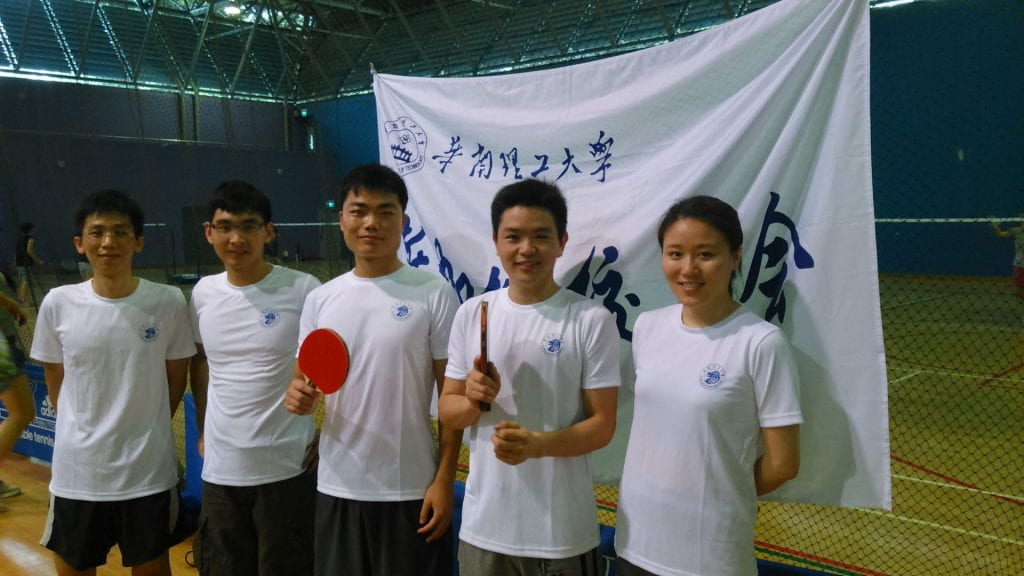2015年10月10日,由华工新加坡校友会发起,同济大学/集美大学新加坡校友会共同主办,多个高校协办的高校校友会系列主题论坛第二期活动,在新加坡春天国际学院圆满结束。此次论坛的主题是“新加坡生活与高尔夫”,由集美大学新加坡校友会副会长展杰,同济大学校友/新中高尔夫球会秘书长袁金荣博士担任主讲嘉宾,近20位听众出席。
展杰”船长”以幽默诙谐的语言介绍了他的航海经历以及上岸后在新加坡的吃喝玩乐等多个方面的经验和体会。袁金荣博士以严谨的PPT介绍了他作为一个”地下工作者”隧道专家在新加坡工作生活的经验。两位嘉宾介绍了共同的爱好高尔夫运动,涵盖了国内与新加坡高尔夫运动的不同,相关调查研究数据,新马高尔夫爱好者组织,以及自己的打球成长经历等多个方面的话题。引起了在座的听众的共鸣,在论坛结束后,有多位感兴趣的听众过微信群进一步参与到高尔夫的交流活动。
新闻
[转自TodayOnline] Wang Danwei 校友 Rise of the machines
[全文转自 http://www.todayonline.com/singapore/rise-machines?singlepage=true]
SINGAPORE — In a future of shrinking birth rates and manpower shortages, Professor Chen I-Ming sees an obvious solution: Robots.
Driverless vehicles smart enough to make decisions about their routes, robots that do the heavily lifting and sorting in an airport or other logistics facility, coordinated groups of robots that can be deployed in dangerous places to carry out disaster rescue or surveillance work — our future could look just like that, with robots making our lives easier, if engineering researchers from Nanyang Technological University (NTU) have their way.
Robots give us hope to move our jobs from a lower paying level that no one wants to do, and upgrade them to a level we all want to do.
Associate Professor Ang Wei Tech
Associate Chair of Research, School of Mechanical and Aerospace Engineering
With an ageing population and low birth rates, Singapore faces the problems of maintaining productivity and manpower constraints, worsened by foreign labour policy restrictions, said Prof Chen. “People no longer want to do dirty jobs,” he said.
In 10 to 20 years, Prof Chen, who develops wearable robots such as those that can be used for physiotherapy, expects robots to be deployed in industries such as manufacturing, construction and cleaning. He is developing robots that can help stroke patients, such as by providing sensory feedback to a patient during physiotherapy sessions, with minimal supervision.
Associate Professor Ang Wei Tech, who is also Associate Chair of Research at the School of Mechanical and Aerospace Engineering, agreed: “Robots give us hope to move our jobs from a lower paying level that no one wants to do, and upgrade them to a level we all want to do.”
Robots that can function in Singapore’s airport, seaports and distribution centres — key to Singapore’s economy — could be just five years away, said Professor Wang Danwei of the School of Electrical and Electronic Engineering.
For example, at the airport, which calls for labour-intensive operations, multiple robots will work together to transport luggage from the check-in counter to the baggage claim area with minimal or no human intervention, minimising the number of human operators needed. The robots will be controlled by people in a central command and control station, said Prof Wang, whose work involves multi-robot coordination, where, using advanced computer algorithms. He has already reached out to Changi Airport to discuss testing the technology.
On the defence front, for example, coordinated robots in groups could be sent to fight our wars in place of soldiers. “That’s something very critical (because) in Singapore we have a very limited number of boys, and we want to save them for better jobs and better lives,” said Prof Wang.
Prof Wang, a recipient of the Alexander von Humboldt Foundation fellowship, also sees robots playing a part in surveillance, monitoring Singapore’s surrounding waters and detecting illegal immigrants or terrorists, as such tasks are tiring for humans. Because the robots can be made small, they can also move underwater without being detected.
They could also be sent into disaster-hit areas — where aftershocks could still endanger people — to search for and locate survivors and their vital signs in the disaster zone. The robots will also be able to convert sensor data into images that their human operators can easily understand, allowing crisis responders to optimise tasks and deploy resources efficiently, Prof Wang said.
In the years to come, Prof Chen, who is also Director of the Robotics Research Centre and the Intelligent Systems Centre at NTU, believes robots will become more intelligent. Cloud data could provide collective intelligence for robots, allowing them to learn not only from their experiences with humans, but also from other robots.
And, said Prof Wang, robotic technology could also pervade aspects of our daily lives by providing an additional transport option such as driverless vehicles. “This way, most of the population can use a combination of mass transportation and local networks of autonomous vehicles,” he said. “People don’t need to buy cars.”
While the researchers acknowledge the gap between building lab prototypes and robots that are robust enough to be deployed in real-life applications, as well as the challenge of moving research to the commercial market, they are certain that more collaborations between researchers and companies will bring it to fruition.
A joint research lab, the ST Engineering-NTU Corporate Lab, was started this year and will receive S$53 million in funding. Prof Wang and ST Engineering’s Vice-President Paul Tan are co-directors of the lab, which focuses mainly on technology development for airport operations and disaster rescue missions.
For robots to become commonplace, public acceptance is also needed. Prof Wang believes that having autonomous vehicles on busy urban roads is likely to come only after society accepts the presence of autonomous robots in other sectors, like logistics.
Assoc Prof Ang, who is working on a surgical robotic arm to reduce hand tremor for surgeons, as well as a robotic arm for packing work in hospitals, added: “A lot of things that use robotic technology will eventually become mainstream, and people won’t realise that it’s in fact robotics technology in the first place.”
校友会组队参加第四届团结杯乒乓球联谊赛
校友会与华工南加州校友会联谊交流
校友会热情接待华工材料科学与工程学院创新班师生游学团
全文转自校友会官网 http://www.alumni-scut.org/xyhd/xydt/19ut2b5l1sovg.xhtml

参访南洋理工大学

参观新加坡国立大学

走访校友企业

与新加坡校友欢乐联谊

合影留念
2015年8月30日,我校材料科学与工程学院创新班(以下简称:游学团)师生26人赴新加坡展开为期4天的游学之行,新加坡校友会热情接待了游学团并全程协助安排行程。
在春天国际学院校董的安排下,师生们首先参访了新加坡顶尖学府新加坡国立大学和南洋理工大学,参观实验室,感受新加坡高校独特的人文氛围,并与相关研究领域专家和校友企业家面对面沟通交流。
参访结束后,师生们游览了新加坡著名景点——鱼尾狮公园、牛车水、乌节路,领略了本土浓郁的历史风情和深厚的人文底蕴,并和新加坡校友们一起BBQ欢乐联谊。师生们纷纷表示,本次游学丰富了视野,收获了知识,更感受到海外校友的深厚情谊,可谓不虚此行!













